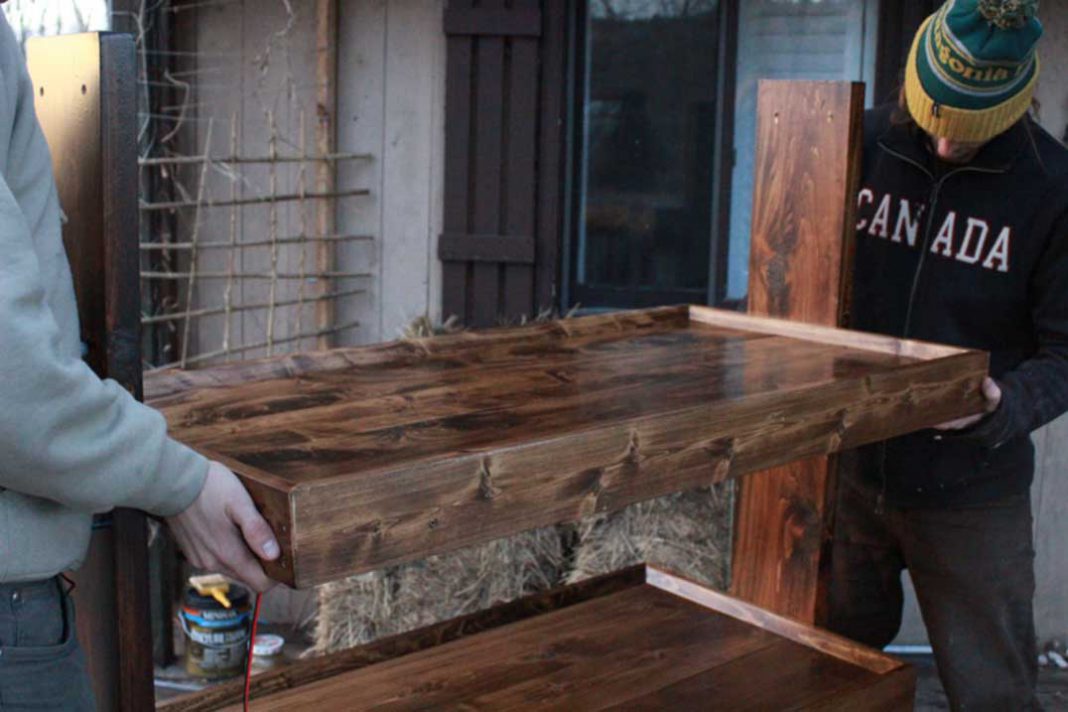Food security issues gain in importance
MANITOULIN—From little seeds, big things can grow. So it has been with the Kids Can Grow program, a concept which grew out of the kernel of an idea 10 years ago and which has now spread into a network of community gardens and several locally designed, constructed and installed seedling incubators in area schools.
Heartwood Mushrooms took on the challenge of creating the new “grow ops” for the classroom after a discussion with Kids Can Grown co-founder Chuc Willson.
“We were getting them from a commercial operation,” said Mr. Willson, who also assisted in developing the units. “I said to Shane (O’Donnell, co-owner of Heartwood Mushrooms) ‘I think we can do better’.”
“He listed some of the shortcomings of the commercially available units,” recalled Mr. O’Donnell. “One was the florescent lights. They were in half-foot, one-and-a-half-foot increments.” That tended to result in very “leggy” seedlings. The new units utilize state-of-the-art LED grow lights designed to meet the full spectrum of light needed for healthy seedlings to develop. “There are some colour gaps in fluorescents.” The LEDs rate at 6,000 kilo-ohms. “Pretty much what you would get from the sun on a summer day with a bright blue sky,” he said.
The design of the commercial units also left something to be desired when it came to the potting trays, so the designers took that into account. “The new units can fit nearly twice as much,” claimed Mr. Willson.
“They do have double the size of a growing area,” admitted Mr. O’Donnell.
Rather than being constructed of somewhat tenuous aluminum framing, the new units are more robust, being constructed of Manitoulin cedar in a three-tier configuration. The units are designed to look attractive and live in a home year-round.
“They look absolutely great,” said Mr. Willson. “They are really more like a piece of furniture. Lynda and I are going to get one for the apartment to have fresh greens through the winter.”
Mr. Willson and his wife developed the Kids Can Grow program a decade ago in response to what they saw as a decline in backyard gardens and the associated skills. The couple decided to be proactive and developed their program to tackle that decline by bringing community gardening and gardening skills into the classroom. Through partnerships with the Good Food Box program and the Child Poverty Reduction Task Force the program has expanded steadily with a well-established track record of success.
Noojmowin Teg (Health Service) has been really instrumental in helping make this happen, noted Mr. Willson. “Of course they have brought a lot to First Nations communities, but they have also made things available for other communities as well,” he said. “We are building a community garden just outside Gore Bay that is part of their programming.”
The new units have now been installed in eight local elementary level schools and Mr. O’Donnell is now looking forward to expanding into the general market. “I have to take a look at the pricing though,” he laughed. “I think the profit on the units we put into the schools is about $30 a piece. But we learned a lot from the experience.”
Heartwood Mushrooms are working on innovative greens production methods and hope to be active with those products in Manitoulin farmers’ markets this year and are conducting research and development into land reclamation strategies that they hope will provide small scale remediation options for small property owners.
“It’s a pretty exciting time,” noted Mr. O’Donnell, as there are increasing numbers of property owners who are taking their environment seriously.
Heartwood Mushrooms can be contacted at sodonne02@gmail.com.




